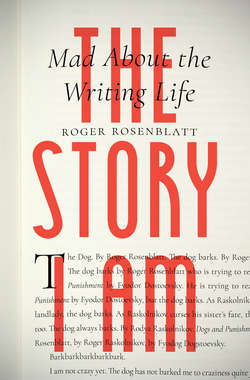Читать книгу The Story I Am - Roger Rosenblatt - Страница 6
На сайте Литреса книга снята с продажи.
ОглавлениеIntroduction
It figured, I suppose, but I never saw the matter clearly until I began assembling this book—just how often I’ve written about writing, the life of the writer, and the written word. Not only in essays but in memoirs, novels, and plays as well. And in a book I wrote on the art and craft of writing, Unless It Moves the Human Heart. The subject kept rearing its siren head. Maybe that’s because it took me so many years before I was doing the creative work I’d hoped to do from the time I was a boy. The world of the writer was the world I sought. I wrote about it, wanting in. And once in, I continued to write about it because trying to describe the writing life can be as entrancing and confounding, not to say as satisfying, as producing a piece of work itself. Well, nearly.
So here are pieces on the satisfactions, sorrows, menaces, and pleasures of the trade—on craft, on teaching writing, on reading, on books and the world of books, on being a journalist, memoirist, essayist, playwright, and novelist—in essence, on all things connected, directly or tangentially, with the life of the writer. As wide-ranging as these pieces are, they also seem to fit with one another. One of the happy surprises of pulling this book together was observing its unity of tone and mood—as though I had been playing a few notes of music at a time, scattered over a great many years, and then heard all the disparate parts coalesce into one recognizable tune.
Music, specifically jazz, in fact, plays a part in these pieces. Alan Bergman, who, in a brilliant partnership with his wife, Marilyn, wrote the lyrics to such standards as “The Way We Were” and “What Are You Doing the Rest of Your Life,” says he hears the words in the music. I realize that I hear the music in the words. I play the piano by ear, and whenever I’m working on something I try to discover the sound of it. As jazz is the art of improvisation, so is writing, at least the way I do it. I hunt for the next word as I hunt for the next note. If I make a mistake, I deliberately try to follow it with another mistake, to make something right out of something wrong, and I continue in this mysterious foraging, as if trying to recall something I never heard before.
A definite passion drives this effort. Some of these pieces were written forty years ago, some in the past year or two. They suggest the same literary inclinations and standards, the same goals aspired to, the same mixtures of exhilaration and exasperation. But running through all that is my pure, rapturous, if often unrequited love of the game—on display in the comic complaints no less than in the expressions of wonderment and appreciation.
My biggest surprise as I collected these pieces was to realize that they defined me as writer. I teach a course in the MFA program in writing at Stony Brook/Southampton called “The Story You Are.” The course’s premise is that every writer tells just one story over a lifetime. The story may take the form of a novel, a play, a memoir, a poem, or an essay, but it is always the same. In the music and common feeling of the pieces in this book I discovered my story. The theme of and reason for everything I’ve ever done were under my nose all the time, like Poe’s purloined letter. I write simply because I am enthralled with the writer’s life, mad for it, and with the act of writing. Between the lines or in them, that is what these pieces say. The love of writing is the story I am.
I’m talking about the love of doing it, the love of process. I realize this marks me as an odd duck among some of my peers, who speak only of the miseries involved in stringing words together. Many of the best writers I know swear they hate writing yet are glad to have written. Not I. To me, the writer’s life is an unending childlike adventure. Every morning you greet the day longing to tell the world something remarkable about itself. And even if it turns out that what you have to say proves less than remarkable, or the world yawns uninterested in your bright bulletins, still the prospect thrills you.
During graduation ceremonies at Stony Brook/Southampton, I tell my MFA students, “Welcome to the world of humiliation, rejection, and poverty.” I don’t mean it, and the students know it. What I really mean is, welcome to the world of your reckless imagining. The lurchings of your mind will defy common sense, including your own. Risk everything, gleefully. Seamus Heaney said it for the tribe: “Walk on air against your better judgment.” It is another way of saying, improvise. Make the music your own and follow it into the dark. You sit at one or another keyboard, and something comes to you. And then you come to it, as if it were waiting for you all along. It was.
—RR
